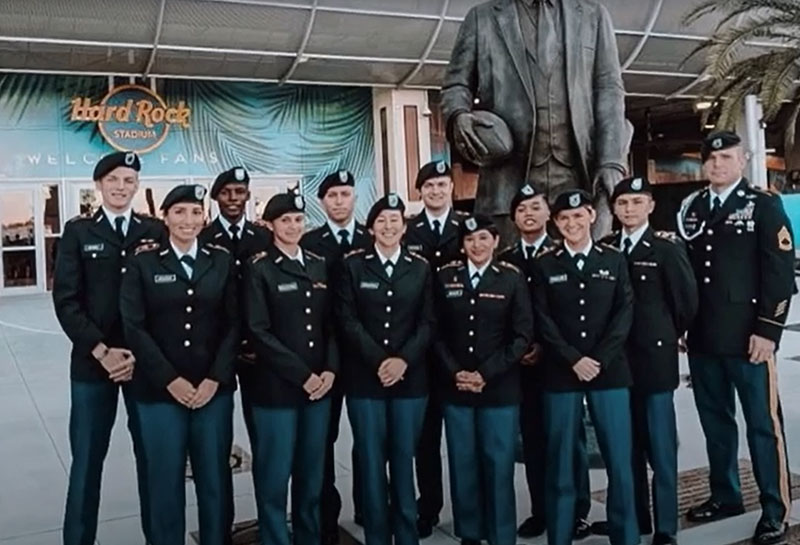Have Questions About NSU's Army ROTC Program or How It Will Benefit You As A Student?
Army ROTC is a college elective program that develops leadership skills in students as they prepare for military service. Find answers about topics like what to expect, scholarships and military obligations.
We’ve compiled this list of questions about the Army ROTC program, dive in to learn why (and how) you should apply to the ROTC.
WHAT TO EXPECT
Enrolling in Army ROTC is not, strictly speaking, joining the Army. You will not be sent to boot camp. You will take an ROTC class for which you receive credit. It’s considered a college elective.
However, the primary purpose of the Army ROTC program is to produce Officers. Young adults must serve as Officers in the Army after graduation if they have received an ROTC scholarship, OR if they have enrolled in the ROTC Advanced Course. Enrolling in the ROTC Basic Course during the first two years of college does NOT obligate you to serve unless you have also received a scholarship. For more details, see: Service Commitment.
Leadership and management skills needed to become a U.S. Army officer or have a successful civilian career.
Students in ROTC learn through a unique program that involves both classroom and live situations. For instance, an ROTC cadet might be found leading classmates through adventure training, down a river in a raft, or up a mountain wall.
SCHOLARSHIPS
Yes. Each year hundreds of students attending colleges nationwide receive ROTC scholarships. ROTC awards scholarships to students studying science, engineering, nursing, business, as well as a variety of other majors.
Scholarships are awarded at different monetary levels. At some schools an ROTC scholarship is worth up to $80,000, which goes towards tuition and educational fees. Also, scholarship winners receive an allowance of up to $1,500 a year.
ROTC scholarships are not based on financial need. Instead, they’re awarded on merit. Merit is exhibited in academic achievement and extracurricular activities, such as sports, student government or part-time work.
No. Anyone can enroll in ROTC. And regardless of whether you’re a scholarship winner or not, all ROTC books, supplies and equipment are furnished at no cost to you.
Scholarships are awarded once a year. Students apply by November 15 and selections are made continuously thru May 15. Four-year scholarship applications must be requested between March 1 and November 1.
Also, once cadets are on campus, two-year and three-year scholarships become available.
Army ROTC scholarships vary based on the length of time remaining for students to complete their degrees.
There are merit-based, two-, three-, and four-year scholarships, which pay full tuition and fees, include a separate annual allowance for books, and a monthly stipend of up to $5,000 a year. Army ROTC scholarships are not retroactive.
Scholarship winners must serve for four years; non-scholarship Cadets who enroll in the ROTC Advanced Course must serve for three years. All who graduate and complete ROTC training are commissioned as Second Lieutenants in the U.S. Army.
OBLIGATIONS AND BENEFITS
During the first two years, ROTC cadets have no military obligation (or the first year in the case of scholarship winners).
The ROTC program is divided into phases: The Basic Course studies Army history, organization and structure. The techniques and principles of leadership and management are stressed throughout.
The Advanced Course concentrates on tactical operations and military instruction, as well as advanced techniques of management, leadership, and command. View course descriptions and learn more about the Military Science and Leadership Minor.
In college and after graduation, cadets find that the training and experience that they have received are assets – whether pursuing an Army or civilian career.
Employers place high regard on the management and leadership skills that ROTC instructors stress. Plus, ROTC looks great on a resume. When cadets complete the ROTC course, upon graduation, they become commissioned officers in the U.S. Army.
The Army offers a wider range of career opportunities, in more places around the world, then any other U.S. military branch.
Visit the website www.goarmy.com.
AFTER GRADUATION
No. You can enroll in all ROTC classes with no service obligation. The obligation comes when you decide to contract into the ROTC program to become an Army Officer.
No. At least two-thirds of the upcoming graduating cadets will receive an active duty tour. Cadets who receive Reserve Duty will serve in local Reserve or National Guard units one weekend a month, or serve in the Ready Reserves with no drilling requirement if a suitable unit is not available where you reside.
The Reserves are one of the best adjunct career and retirement systems in the U.S. today.
There are surely some career tracks where ROTC may not help you, but the exceptional record of graduating cadets getting good jobs in their fields is well above average.
In the Reserves, there are also a lot of job networking and contacts, and most employees view Reservists or Officers leaving active duty in very positive terms.
Further, students that emphasize their ROTC enrollment are generally viewed as desirable to most employers because of their competitive leadership and managerial abilities, maturity, and time management skills.
Army ROTC is one of the only college courses that teaches leadership. This training is invaluable for any career that involves leading, managing and motivating people or fostering teamwork.
Young Army Officers are typically responsible for hundreds of soldiers and millions of dollars in equipment; this kind of management experience can be very attractive for post-Army employers. For more details, see: Legacy & Value.
ACADEMICS
No. Our current cadet corps has an average cumulative GPA above the general university average. Yes, there are some time demands and some voluntary extracurricular activities in ROTC. But, simply put, ROTC cadets are more mature and better time managers than many students.
Your academic and athletic success is the highest priority and we stress that. You must do well academically and athletically to succeed in ROTC. Army ROTC provides the best leader development program in the world. No corporation or leadership institute can provide the combined classroom and hands-on leadership training, education and practice as Army ROTC.
During the academic year, your focus is on academics and earning your degree — with ROTC classroom instruction and labs complimenting that education. What’s best about Army ROTC is that while learning to become an Army officer, you are interacting, socializing and learning with students with diverse backgrounds, experiences, political ideologies and goals.
This dynamic on campus develops the team-building, negotiating and consensus-building skills that Army officers need in helping the people of the world establish democratic systems, govern & secure themselves and institutionalize freedom and human rights.
No, ROTC cadets do not go to boot camp. They go directly to college where they earn their degree.
Army ROTC cadets are allowed to major in nearly all academic areas.
Take a few minutes to discover which programs at NSU fit your interests and goals.
Army ROTC classes normally involve one elective class or lab per semester. Although the classes involve hands-on fieldwork as well as classroom work, they are standard college classes that fit into a normal academic schedule.
These courses can help students with personal and academic decision-making while giving them the tools to exercise leadership in college life, even before graduating and becoming Officers. For more details, see: Curriculum.
LIFESTYLE
You have to be well-groomed; hair off your ears and not down your shoulders but a crewcut is not required. You will learn how to wear a uniform properly, but the uniform is only required to be worn during class times and training.
Finally, harassment of any type is extinct; it is not acceptable. We emphasize proper decorum, respect, military courtesies, ethics and standards of conduct; all of which apply equally well to non-military, professional careers.
If you enroll in Army ROTC, we will help you become a better person in manifold ways – no doubt about that. ROTC will: Give you better leadership and managerial skills applicable to any field. Provide you a lot of personal attention, encouraging you to get good grades and further mature.
Class sizes are small and everyone is given personal counseling. We compel you to stay in shape and improve your physical fitness.
Yes, there are some progressive physical fitness requirements and you cannot be overweight and complete the program. We give you the opportunity to learn what the military is all about these days – the role of the Army and its soldiers, (strategy, politics, technology, standards, career fields, etc.)
We provide additional fun and learning activities, and opportunities for you to make more friends than virtually any other organization on campus. Cadets consistently relate that one of the best aspects of the ROTC program is the camaraderie students find among each other -that is what Esprit de Corps or belonging is all about.
Army ROTC Cadets have the same lifestyles and academic schedules as any other college students. But there are two intensive Army ROTC courses that take place on Army Posts, usually during the summer:
- Leader’s Training Course - a four-week summer course at Fort Knox, Kentucky, is ONLY for students who enroll in Army ROTC going into their junior years without having taken the first two years of military science classes.
- Leader Development and Assessment Course - all Cadets who enter the Advanced Course must attend this four-week summer course at Fort Lewis, Washington, between their junior and senior years.
It depends on the Army branch the Cadet chooses and the unit to which he/she is assigned. However, Army missions and challenges are always changing, so there’s no way to know in advance which specialties and units will be needed where.
All soldiers in the Army or Army Reserve face the possibility of deployment at some point during their careers. But all soldiers are fully trained and proficient in the tasks and drills of their units.
And officers are specifically trained to make the right decisions so that missions can be carried out safely and successfully.
Yes. Selected Cadets may choose to serve part-time in the U.S. Army Reserve or Army National Guard while pursuing a civilian career. For more details, see: Active Duty & Army Reserve or the Army National Guard website.
Army ROTC graduates are commissioned as U.S. Army Second Lieutenants. They then receive specialized training in one of 17 different Army branches.
During their Army careers, they’ll receive regular professional training as they advance through the ranks, and they’ll have many opportunities for advanced leadership positions and post-graduate education.
Visit the Benefits section of the www.GoArmy.com website for complete details. Specifically, the Money sub-section provides details on pay for both Officers and Enlisted Soldiers.
Did You Know?
The ROTC program in South Florida started back in 1956 at the University of Miami. The program was relocated to Florida International University in January 1996 and was officially activated on July 1, 1996.
The average cadet enrollment in the ROTC Southern Strike” program is over 225 students. The program is also part of the Hispanic Access Initiative established in fiscal year 2003.

The Battalion now has 7 partnership schools: Nova Southeastern Univeristy, Barry University, Broward College, Florida Atlantic University, Florida Memorial University, Miami Dade College, Palm Beach Atlantic University, and University of Miami.
Join a team that values personal courage, loyalty, integrity, honor, respect and duty.
NSU Army ROTC:
Phone: 954-262-8510 or 954-262-8509
Fort Lauderdale, FL, 33328-2004

